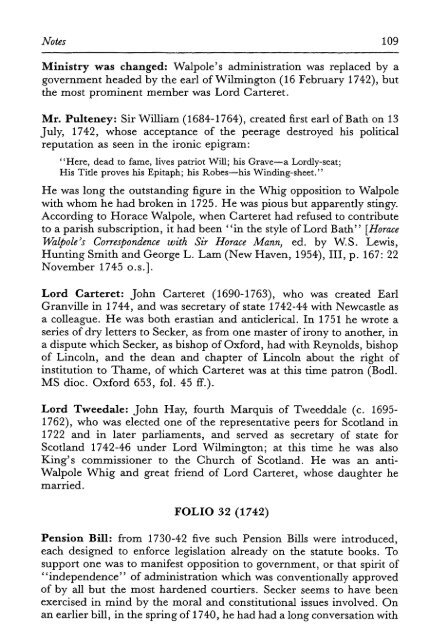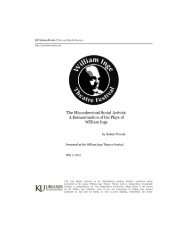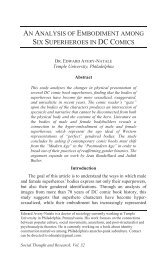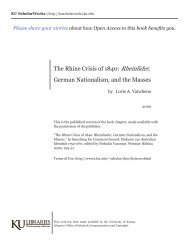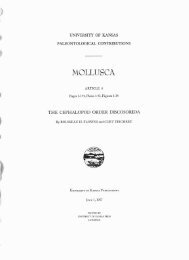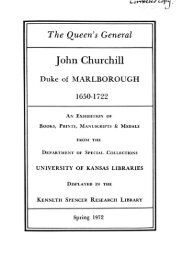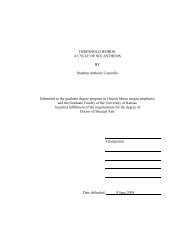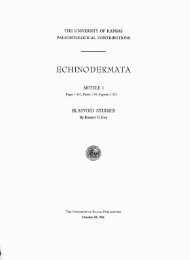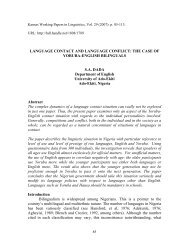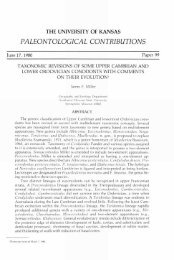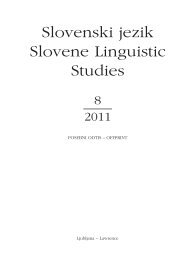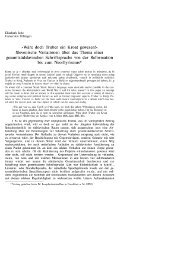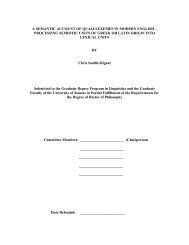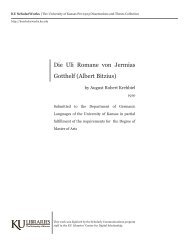Archbishop of Canterbury - KU ScholarWorks - The University of ...
Archbishop of Canterbury - KU ScholarWorks - The University of ...
Archbishop of Canterbury - KU ScholarWorks - The University of ...
You also want an ePaper? Increase the reach of your titles
YUMPU automatically turns print PDFs into web optimized ePapers that Google loves.
Notes 109<br />
Ministry was changed: Walpole's administration was replaced by a<br />
government headed by the earl <strong>of</strong> Wilmington (16 February 1742), but<br />
the most prominent member was Lord Carteret.<br />
Mr. Pulteney: Sir William (1684-1764), created first earl <strong>of</strong> Bath on 13<br />
July, 1742, whose acceptance <strong>of</strong> the peerage destroyed his political<br />
reputation as seen in the ironic epigram:<br />
"Here, dead to fame, lives patriot Will; his Grave—a Lordly-seat;<br />
His Title proves his Epitaph; his Robes—his Winding-sheet."<br />
He was long the outstanding figure in the Whig opposition to Walpole<br />
with whom he had broken in 1725. He was pious but apparently stingy.<br />
According to Horace Walpole, when Carteret had refused to contribute<br />
to a parish subscription, it had been "in the style <strong>of</strong> Lord Bath" [Horace<br />
Walpole }s Correspondence with Sir Horace Mann, ed. by W.S. Lewis,<br />
Hunting Smith and George L. Lam (New Haven, 1954), III, p. 167: 22<br />
November 1745 o.s.].<br />
Lord Carteret: John Carteret (1690-1763), who was created Earl<br />
Granville in 1744, and was secretary <strong>of</strong> state 1742-44 with Newcastle as<br />
a colleague. He was both erastian and anticlerical. In 1751 he wrote a<br />
series <strong>of</strong> dry letters to Seeker, as from one master <strong>of</strong> irony to another, in<br />
a dispute which Seeker, as bishop <strong>of</strong> Oxford, had with Reynolds, bishop<br />
<strong>of</strong> Lincoln, and the dean and chapter <strong>of</strong> Lincoln about the right <strong>of</strong><br />
institution to Thame, <strong>of</strong> which Carteret was at this time patron (Bodl.<br />
MS dioc. Oxford 653, fol. 45 ff.).<br />
Lord Tweedale: John Hay, fourth Marquis <strong>of</strong> Tweeddale (c. 1695-<br />
1762), who was elected one <strong>of</strong> the representative peers for Scotland in<br />
1722 and in later parliaments, and served as secretary <strong>of</strong> state for<br />
Scotland 1742-46 under Lord Wilmington; at this time he was also<br />
King's commissioner to the Church <strong>of</strong> Scotland. He was an anti-<br />
Walpole Whig and great friend <strong>of</strong> Lord Carteret, whose daughter he<br />
married.<br />
FOLIO 32 (1742)<br />
Pension Bill: from 1730-42 five such Pension Bills were introduced,<br />
each designed to enforce legislation already on the statute books. To<br />
support one was to manifest opposition to government, or that spirit <strong>of</strong><br />
"independence" <strong>of</strong> administration which was conventionally approved<br />
<strong>of</strong> by all but the most hardened courtiers. Seeker seems to have been<br />
exercised in mind by the moral and constitutional issues involved. On<br />
an earlier bill, in the spring <strong>of</strong> 1740, he had had a long conversation with


